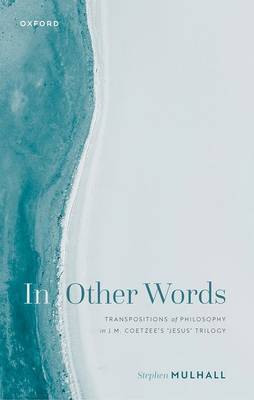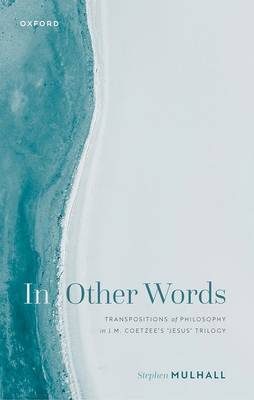
- Afhalen na 1 uur in een winkel met voorraad
- Gratis thuislevering in België vanaf € 30
- Ruim aanbod met 7 miljoen producten
- Afhalen na 1 uur in een winkel met voorraad
- Gratis thuislevering in België vanaf € 30
- Ruim aanbod met 7 miljoen producten
Zoeken
In Other Words
Transpositions of Philosophy in J.M. Coetzee's 'Jesus' Trilogy
Stephen Mulhall
Hardcover | Engels
€ 132,45
+ 264 punten
Omschrijving
J. M. Coetzee's 'Jesus' Trilogy extends and intensifies his long-term interest in engaging with a wide range of texts, themes and assumptions that help constitute the history of Western European philosophy. In this commentary, Stephen Mulhall extends his own earlier work on Coetzee's previous stagings of the ancient quarrel between philosophy and literature by identifying and following out various ways in which the 'Jesus' Trilogy activates and interrogates themes drawn from Wittgenstein's later philosophy. These themes include rival conceptions of counting and reading, the relation between concepts and wider forms of life, and the intertwined fate of philosophy, literature and religion in a resolutely secular world. In these ways, Wittgenstein's, and so Coetzee's, visions of the world disclose their uncanny intimacy with issues and values central to the critique of modernity elaborated in the work of Nietzsche, Heidegger, and Sartre.
Specificaties
Betrokkenen
- Auteur(s):
- Uitgeverij:
Inhoud
- Aantal bladzijden:
- 144
- Taal:
- Engels
Eigenschappen
- Productcode (EAN):
- 9780192869715
- Verschijningsdatum:
- 17/02/2023
- Uitvoering:
- Hardcover
- Formaat:
- Genaaid
- Afmetingen:
- 147 mm x 222 mm
- Gewicht:
- 312 g

Alleen bij Standaard Boekhandel
+ 264 punten op je klantenkaart van Standaard Boekhandel
Beoordelingen
We publiceren alleen reviews die voldoen aan de voorwaarden voor reviews. Bekijk onze voorwaarden voor reviews.











